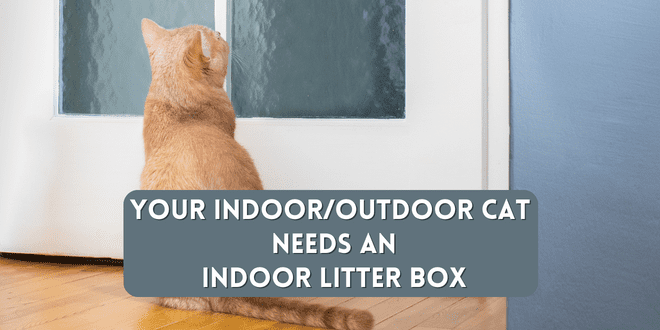
If you have an indoor/outdoor cat and you’ve trained that kitty to eliminate exclusively outdoors, you may be setting yourself up for a behavior problem down the road.
Some cat parents who allow their cats outdoors have tried to totally do without having an indoor litter box. They may have trained their cats to scratch at the door, use a pet door, meow or maybe the cats are just let out on a regular schedule. This can be short-sighted thinking for the following reasons:
Foul Weather
Your cat may not enjoy going outdoors during extremes in temperature, rain, snow, or any other severe weather conditions. If the cat is forced to go out there for elimination it can become very stressful, and in some cases, even dangerous.
Threats from Other Animals
Your cat may not have a problem eliminating outdoors until the one day she comes face to face with another cat or dog. Going outdoors may then become a very stressful experience if your cat has to worry about whether she’s at risk of being ambushed by the neighborhood bully. A physical encounter can even put your cat in danger of injury. If your cat anticipates potential ambush, she may become reluctant to go outdoors or may even start eliminating inside in inappropriate locations to avoid a conflict with an outdoor animal.
Illness or Injury
Cats who aren’t feeling well or have some type of injury will find it more difficult to go outdoors for elimination.
Senior Issues
Your cat may never have had a problem going outdoors to eliminate in years past but as she gets older and less mobile, it may become more uncomfortable. Cold and damp weather will be especially aggravating to a senior cat’s joints.
Garden Maintenance
When your cat eliminates outside do you know where ? Does she eliminate in your garden? In the woods? In your neighbor’s backyard? It can be unpleasant to have a garden filled with cat feces.
Lack of Monitoring
When you aren’t scooping a litter box on a regular basis you have less information available to you regarding your cat’s health. You’ll be less aware of any potential health issues such as diarrhea, constipation, blood in urine, increase or decrease in urine amounts, etc. When you scoop the litter box it becomes an opportunity to notice any changes in your cat’s elimination habits. Early detection of potential health issues may make a difference when it comes to a speedy recovery and less suffering.
Need More Information?
For more information on cat behavior and training, refer to the books by Pam Johnson-Bennett. Pam’s books are available at bookstores and online. We’ve included links to Amazon here on our website.
If you have a question regarding your cat’s health, please contact your veterinarian. This article is not intended as a replacement for your cat’s veterinary care.




